
 |
|
|
#1 |
|
Member
Join Date: Jun 2008
Location: The Sharp end
Posts: 2,928
|
A good compass can be an essential piece of equipment!
Anyone got anything like this?  
|
|
|

|
|
|
#2 |
|
Member
Join Date: Dec 2004
Posts: 1,247
|
well, YES, but mine are a lot more modern and made out of plastic.
Neat find--Congratulations! I always liked the old instruments. BTW, Does it have a bronze blade concealed in the case, so we can call it an edged weapon? 
|
|
|

|
|
|
#3 |
|
Arms Historian
Join Date: Dec 2004
Location: Route 66
Posts: 9,951
|
Very nice piece Gene, and though I am not sure if this is specifically military or not, it is known that officers often carried such items in thier kit while on campaign or expeditions. It seems that these kinds of instruments, along with telescopes or binoculars have occasionally been the topic in a number of arms journals. One that comes to mind is that the journal or annual of the National Army Museum in London. They often published either new additions or brief articles on these types of gear, I believe one was on field chairs, of the type of folding chairs seen in period photos of officers in camp.
These things were essential in those times pre-GPS ! In travelling cross country in this rig, I typically honestly have no idea where I am half the time until the wife tells me to turn. When by myself in the jeep its tough, remember, asking for directions is against the 'guy code'  I remember going someplace with a buddy once and following (I thought) the directions scribbled on a bit of paper...we finally realized we were going in circles when we passed the same building about 5 times!! I remember going someplace with a buddy once and following (I thought) the directions scribbled on a bit of paper...we finally realized we were going in circles when we passed the same building about 5 times!!  Thanks Gene for sharing this beauty, most interesting, and I'd like to see if other associated examples, especially with known military use, are out there. All the best, Jim Fearn, I guess we crossed posts.....I burst out laughing with the concealed blade note!!!  pardon the pun, but you truly are sharp!!! LOL pardon the pun, but you truly are sharp!!! LOLBest, Jim |
|
|

|
|
|
#4 | |
|
Member
Join Date: Mar 2006
Location: Room 101, Glos. UK
Posts: 4,184
|
Quote:
|
|
|
|

|
|
|
#5 |
|
Member
Join Date: Mar 2006
Location: Room 101, Glos. UK
Posts: 4,184
|
actually my post above was a delaying tactic to get the photo of mine ready.
3" dia. dial, box is just under 6 in. sq. set up on the box, gnomon elevated to corect 52 degree angle, needle lock disengaged, feet adjusted to level device. 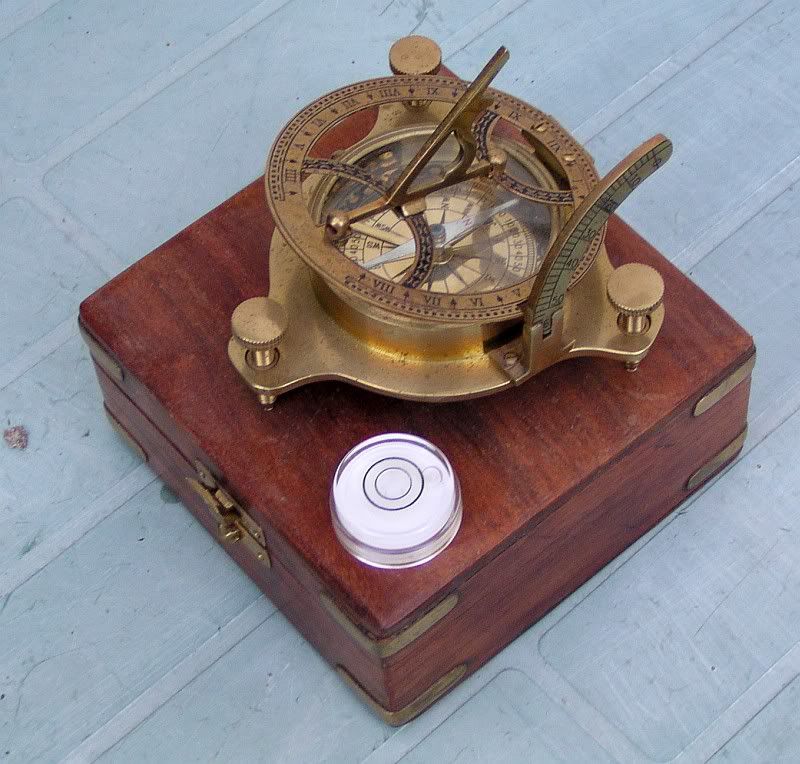 folded up, needle lock engaged to press needle up into glass to prevent it flopping about. 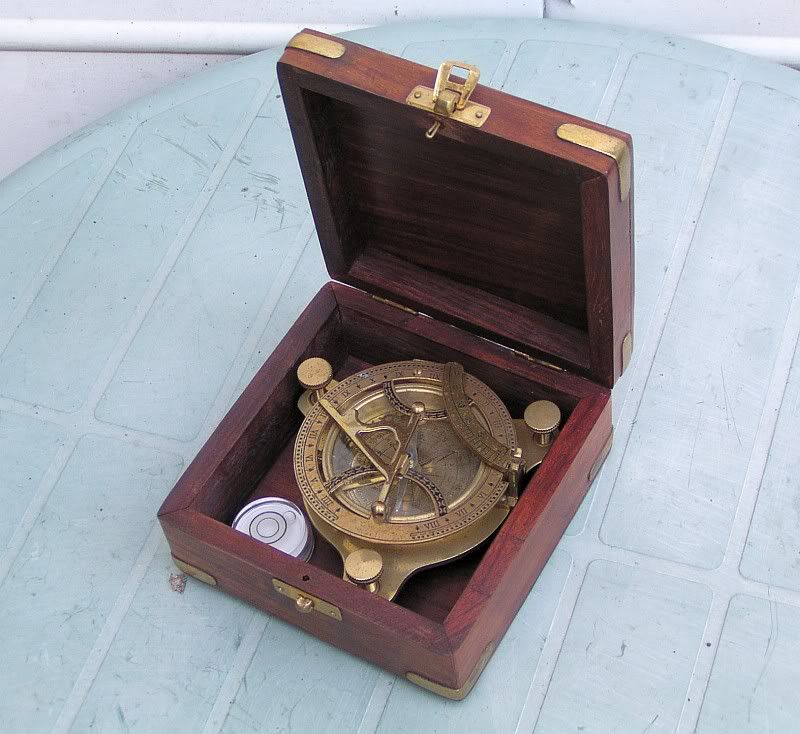 note the antique cheap plastic bubble level i found in a local DIY chain. i note that atlantia''s pocket model also has a needle locking device that is engaged when the lid is closed. this lifts the needle off the pin and prevents damage to the bearing during travel. Last edited by kronckew; 5th July 2009 at 09:04 PM. |
|
|

|
|
|
#6 |
|
Member
Join Date: Jun 2008
Location: The Sharp end
Posts: 2,928
|
Hi Guys,
lol, I know its not a weapon, but I've been toying with the idea of posting it for ages. When you think about 'officers' campaign equipment, then certain things spring to mind, essential items or certainly very useful ones. I posted my little 'army' Dollond Telescope some time ago as its a specific small type associated with officers in the field, but these little 'pocket' wood cased compasses seem to be rather unusual. I admit to knowing almost nothing apart from what my eyes tell me about mine! Its 2 1/4 inches square, mahogany cased, needle has a 'lock' lever which is engaged when the lid is closed. No firm ideas on date or even where it was made, as its got no makers marks etc. Hopefully others will have similar pieces. Thanks all Gene |
|
|

|
|
|
#7 |
|
Member
Join Date: Jun 2008
Location: The Sharp end
Posts: 2,928
|
kronckew,
No fair! Your's tells the time as well 
|
|
|

|
|
|
#8 |
|
Member
Join Date: Dec 2004
Location: NC, U.S.A.
Posts: 2,100
|
Very nice specimens, gents. I've always wanted to pick up one of these for my "nautical collection", for although sextants were the tool of choice, compasses also served on many a merchant/privateer vessel. I like to see these related items in posts since they serve to support the study of military life. Just picked up an old maritime telescope myself recently, made by Spencer, Browning and Rust, ca. 1800. Thanks again for posting these.
|
|
|

|
|
|
#9 | |
|
Member
Join Date: Mar 2006
Location: Room 101, Glos. UK
Posts: 4,184
|
Quote:
 as a proper victorian military officer, i would of course have servants to carry it for me and set it all up in my tent along with my bed, dresser, writing table, wash stand, potty, etc. and while they were at it, set out my fresh dress uniform for dinner, clean and polish my other set of boots, sharpen my sabre, and generally tidy up. they do still make smaller pocket versions of that one, one just right for each occasion. they of course are NOT reproductions, having been in continuous mfg. since pre-revolutionary times  stanley's of london sundial compasses it's worth taking a look at their main site home as well, lots of nice new goldy shiney things and even some long sharp pointy things (sadly, repros only). stanley's main site Last edited by kronckew; 7th July 2009 at 11:17 AM. |
|
|
|

|
|
|
#10 | |
|
Member
Join Date: Jun 2008
Location: The Sharp end
Posts: 2,928
|
Quote:
 Any chance you could show some pics of your 'field gear'? This for me is one of the most interesting parts of studying the history of warfare. We concentrate on the weapons themselves, so its easy to forget just how vital these little 'elements' were in warfare. I'm always on the lookout for things like this. Perhaps we could see if anyone has anything else along these lines? Maps. Signalling gear. Medical/surgical equipment. Optical devices. |
|
|
|

|
|
|
#11 | |
|
Member
Join Date: Jun 2008
Location: The Sharp end
Posts: 2,928
|
Quote:
Very nice items, hugely expensive in their day, and of absolutely vital importance especially to mariners. I won't mind at all if you post pictures of it 
|
|
|
|

|
|
|
#12 |
|
(deceased)
Join Date: Dec 2004
Location: Portugal
Posts: 9,694
|
Hi guys,
Little antique curious stuff is my middle name  . .May i introduce a less austere little device... just for the fun  . .An old wood handmade Compass + Sundial, of reduced dimensions (less than 3x2") and weight (aprox. 1 ounce). I like the artist's naive presumption to tag the thing with REGISTERED MARK and made by the REAL AUTHOR named JOĆO DA SILVA. Well, it might not be an accurate guiding tool, but certainly a rare object  . .Allright, don't hit me; i just couldn't resist showing this little thing. Fernando . |
|
|

|
|
|
#13 | |
|
Member
Join Date: Jun 2008
Location: The Sharp end
Posts: 2,928
|
Quote:
Hi Fernando, What a Charming little instrument! I just love the decoration. Especially the 'Sundial' numbering inside the case! The way it has been put together actually reminds me of victorian 'Ouija Boards'. LOL, hope it IS pointing to north, and not a 'spirit compass'  Its lovely Fernando, any ideas of age? Regards Gene |
|
|
|

|
|
|
#14 |
|
Member
Join Date: Dec 2004
Posts: 1,247
|
Hi Fernando,
Amusing little instrument, because Silva (link) has been making compasses since 1928. In Sweden. I'm not sure whether yours is older or younger than that. That said, does your device actually work? Does the compass point north? If the sundail was supposed to be accurate, the angle between the string (gnomon) and the base should be roughly the latitude for which it was manufactured. Best, F Last edited by fearn; 7th July 2009 at 09:11 PM. |
|
|

|
|
|
#15 |
|
(deceased)
Join Date: Dec 2004
Location: Portugal
Posts: 9,694
|
Now, i've got myself into troubles; i forgot these guys want to know everything
 . .The Swedish Silva is just a coincidence; the name Silva is one of the oldest Portuguese family names. I would swear this Joćo da Silva was from Braga, a city here in the north, but i don't remember where i have read this. Searching the name per se is useless, as it is so vulgar as John Smith. But in any case this little device is local handcraft. Amazingly, not necessarily being a 'sworn' apparatus, it does point (shamely) to North and, going out to the veranda i positioned it in the North ditrection and it indicated the right time over here: 5 pm it was. Hard to tell its age; thirties or most possibly earlier. I wish i traced some other example i saw illustrated somewhere, which i think once happened. Fernando Last edited by fernando; 7th July 2009 at 10:33 PM. Reason: term correction |
|
|

|
|
|
#16 |
|
Member
Join Date: Dec 2004
Posts: 1,247
|
Thanks Fernando.
Nothing shameful about it--if it works, it works, and that's the most important thing any compass can do. I was concerned that it was supposed to be a cheap ripoff, but simple as it is, it was properly designed and built. F |
|
|

|
|
|
#17 |
|
(deceased)
Join Date: Dec 2004
Location: Portugal
Posts: 9,694
|
Hi Fearn ... and others,
Urgent correction to my lousy english  . .I meant shamely, as it hesitates a bit before it points north; probably missing some of its original magnetic load. Fernando |
|
|

|
|
|
#18 |
|
Member
Join Date: Mar 2006
Location: Room 101, Glos. UK
Posts: 4,184
|
i have always been fascinated by sundials.
i frequently use the one in my garden as a backdrop for my blade photos. i use a simple flat dial with a gnomon set at the local latitude angle. 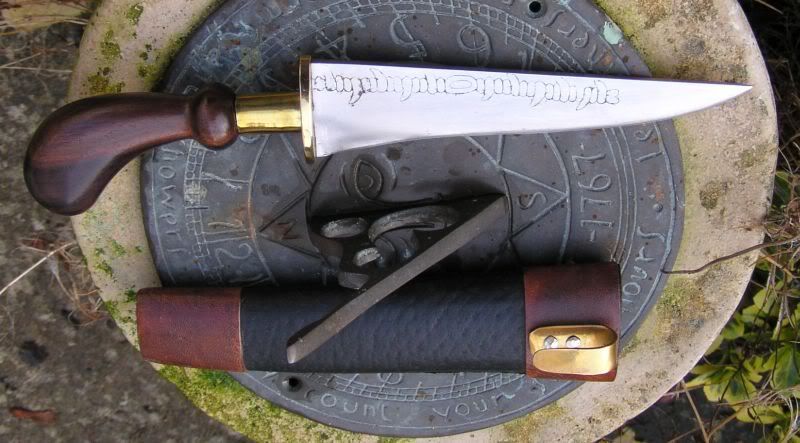 here shown upside down as the blade is the star. i used to have an armillary sphere there, 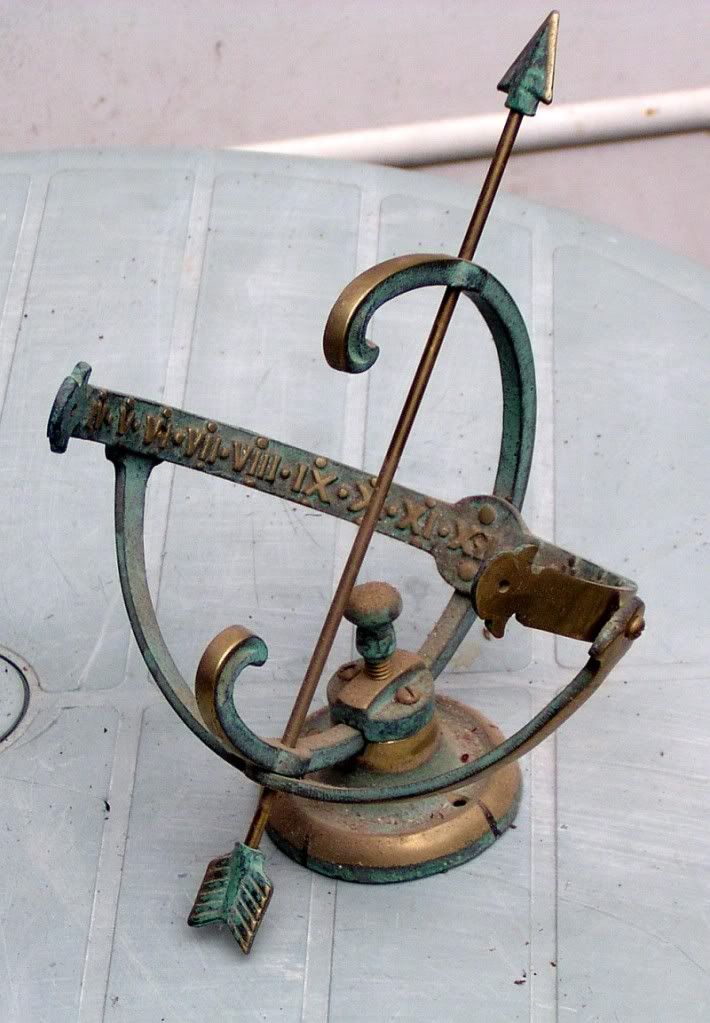 but it was a bit hard to read. lives on my window sill now. i also have a sheperd's stick sundial like this one somewhere:  Also known as a Pillar Dial, this is one of the earliest and most widespread forms of sundial. To use, the folding gnomon is swung around to the correct position for the time of year (the months are indicated by letters around the base). The sundial is then suspended so that it hangs vertically. The shadow of the gnomon then falls straight down and ends somewhere between the hour lines. Each line represents either an hour of the morning or afternoon, as it works by plotting the rise of the sun till noon and its subsequent fall. This type of sundial is specific to a particular latitude, and this one is set for a latitude of 52 degrees. Originally carved in ivory, bone or wood, this example is cast in resin with pewter fittings. another is the more futuristically modern all plastic optical one here: 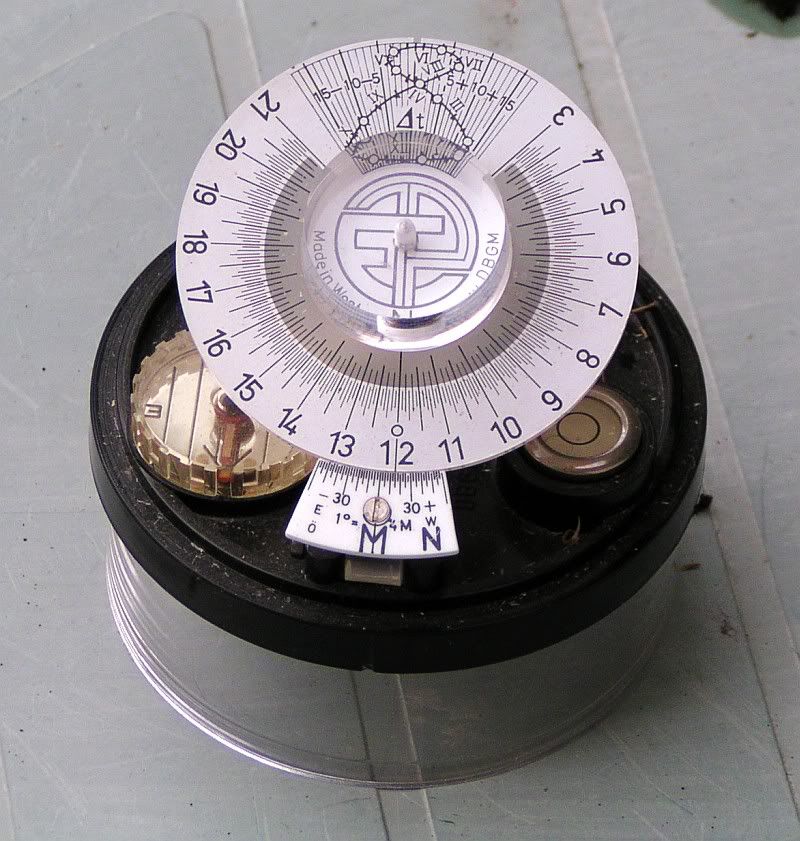 the gnomon is actually a circular acrylic prism that focuses the sun into a pointer along the dial. it has an inbuilt spirit level, compass and angle adjustment as well as a vernier for adjusting the equation of time corrections. the dial rotates like an old circular slide rule to allw compensation for time zones. all fits into itself for travelling. it is accurate to the minute. and finally, here's one i made earlier: these are called diptych dials 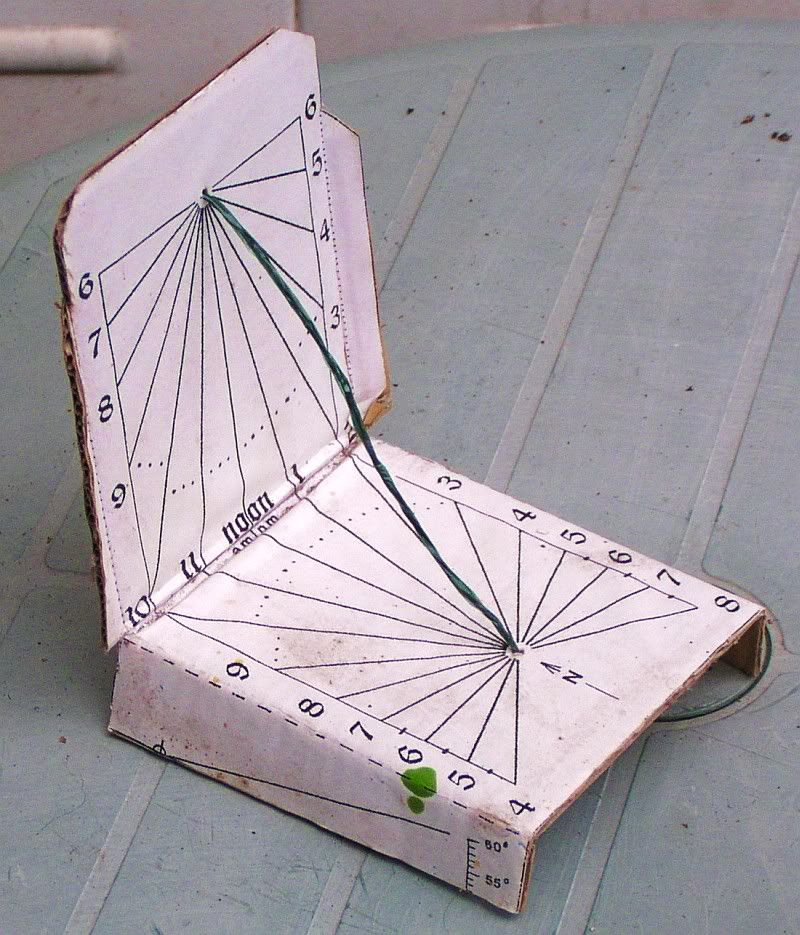 very similar to the 'da silva one above, but tells time on both the horizontal and vertical parts. the string is set at a general angle for the latitude, but you can adjust by trimming the base to compensate for your precise latitude if desired. |
|
|

|
|
|
#19 |
|
Member
Join Date: Mar 2006
Location: Room 101, Glos. UK
Posts: 4,184
|
the sun is of course, not cooperating today, so they are not actually showing the time.
 if you are into making your own, here's the page that shows six types of sundial. LINKY, including the diptych these are many other types of sundial, and many unusual portable ones, google for more info.... edited: found an online cc. of an optical one like mine actually in the sun  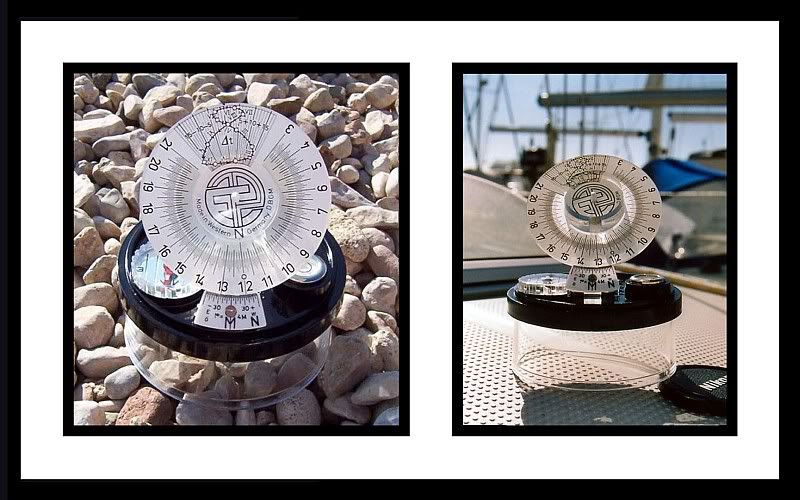 someone actually makes a digital sundial:  quite clever, i'll have to buy one of those i think. uses fractal geometry to make thin optical filters in the upper section that illuminate as mirror imaged digits which reflect correctly in the base mirror. if you have a large garden, here is a fun one, the analemmatic,  which can be made in simple stepping stones like above. YOU are the gnomon, as in this one:  you stand on a sliding scale that corresponds to the month there was a website that will calculate the plans and let you print it out, depends on location. there are also some freeware and shareware progs that calculate & let you print plans for a wide assortment of sundials for your house or garden. or your pocket 
Last edited by kronckew; 8th July 2009 at 02:41 PM. |
|
|

|
|
|
#20 |
|
(deceased)
Join Date: Dec 2004
Location: Portugal
Posts: 9,694
|
May i introduce these two little instruments; better say, replicas, probably functional, bought in the souvenir shop French Chateau d'Ussé, back in 1992.
One is a brass ring, with a sliding mid section with a hole that allows the sun to goin in and point the hours in the opposite inner side. It has readings for the months of the year, as may be seen in the outer part. It also has an inscription, probably engraved in the original it was replicated from: . TO.H.S.THON ANNO.1721. Amazingly, i have just had the idea to browse these initials in the web, and look what i found: http://www.abc.net.au/tv/collectors/txt/s2288621.htm The other is a silver articulated double arch, and it has readings (latitudes) for the cities of Paris, Florence, Hamburg and Heilderberg. Both items were sold with an instructions book, but i don't know where they are by now. Have you guys ever seen such things? Fernando . |
|
|

|
|
|
#21 |
|
(deceased)
Join Date: Dec 2004
Location: Portugal
Posts: 9,694
|
|
|
|

|
 |
|
|